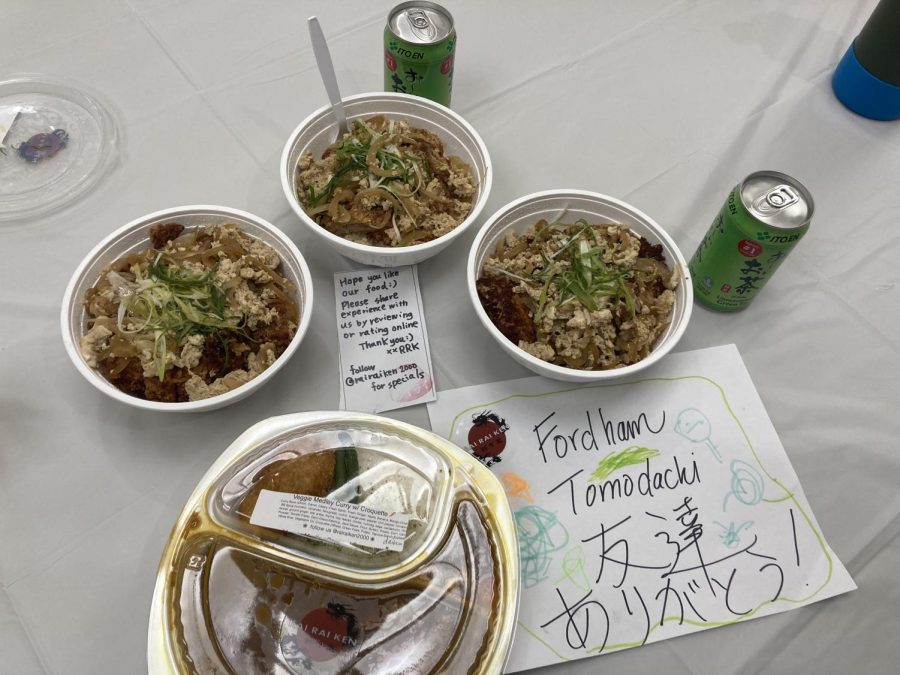Students Found First Japanese Culture Club at Fordham
Fordham Lincoln Center’s Japanese community reflects on their progress in expanding their presence during the fall 2022 semester
COURTESY OF KAREN WATANABE
Tomodachi provides chicken katsudon (“katsu” meaning “to win”) made by Rai Rai Ken, a Japanese-owned restaurant located at East Village, to club members prior to midterm exams. It is a tradition among Japanese students to eat katsudon the night before taking an important test or school entrance exam.
February 8, 2023
CORRECTION: A previous version of this article incorrectly stated Maria Komiyama’s place of birth. As of Feb. 8, 2022, the article now reflects that Maria was born in Hawaii and identifies as Japanese American.
Since its inception in the fall 2022 semester, members of Tomodachi, the Japanese cultural club at Lincoln Center, have organized a variety of meetings and events with the goal of raising awareness about Japanese culture.
The visionary behind Tomodachi is founder and President Karen Watanabe, Fordham College at Lincoln Center (FCLC) ’24. As a Japanese American, Watanabe created the club as an opportunity for Fordham students of Japanese descent to be actively involved in preserving their identities and exchanging their culture with the campus community.
When entering Fordham, Watanabe said she was disappointed that Fordham did not have a Japanese culture club, unlike other New York City schools. Both New York University and Columbia University have Japanese student organizations which have hosted numerous events on and off campus. Additionally, Fordham’s Japanese program consists of limited course offerings covering history, language and literature.
“There is so much more to Japanese culture beyond what we might have thought we knew.” Karen Watanabe, Tomadachi president
“I realized that there is not a place on campus for people to go beyond taking a language course at Fordham. There is not a lot of educational presence about Japanese culture,” Watanabe said. “But there are definitely a lot of people who are interested in the culture, and I’ve also met several Japanese students who want to get in touch with their cultural roots.”
Fellow Japanese American Maria Komiyama, FCLC ’24, serves as Treasurer of Tomodachi. She said she was interested in creating the club as a way to “reconnect more with her identity and being surrounded by other Japanese students,” especially at a university that claims its core values are diversity, equity and inclusion in all dimensions.
Working with three other founding members, one who is Japanese-American and another is Japanese, Watanabe and Komiyama channeled their ambitions into biweekly meetings and outings that showcased Japanese traditions, food, art and history. Fordham students, both Japanese and non-Japanese, have since participated in a range of activities, including a trip to the Noguchi Museum, making traditional rice-balls (“onigiri”) and a tie-dye event (“shibori”).
In the one semester that it has been active, Tomodachi has rapidly garnered more than 120 members on its email list, as well as an average of 10-15 members at general meetings and 25-30 members attending outings.
Tomodachi has three primary objectives in its contribution to the Fordham community, according to Watanabe. First, education is necessary to steer away from common misconceptions and stereotypes about Japanese culture. Watanabe and Komiyama made it clear that Japan, like any other nation, possesses far more complex cultural and historical aspects than most people think.
“When one thinks about Japanese culture, they make assumptions like ‘You eat sushi?’ or ‘You watch anime?’” Watanabe explained. “There is no denial that such elements do exist in Japan, but there is so much more to Japanese culture beyond what we might have thought we knew.”
Supporting Japanese-owned businesses around New York City is another important goal for the Tomodachi Club. Watanabe and Komiyama attributed this ambition to the two years of COVID-related closures of Japanese supermarkets and restaurants, specifically those located on the corner of Stuyvesant and East Ninth streets in the East Village (“Little Tokyo”).
“What I like about our club is how we develop strong relationships with small businesses,” Watanabe said in reference to Face Records, a Tokyo-based vinyl records store that the club visited on Dec. 3. The store, which is located in Brooklyn, is renowned for its importation of vinyl records and CDs consisting of different genres from Japan, such as city pop, funk and soul.
The Tomodachi Club’s final goal is to create a welcoming and inclusive environment among students with varying levels of knowledge about Japanese culture.
“Both offices (Brooklyn and Tokyo) followed us on Instagram,” Watanabe explained. “So it was amazing to see how we started as a small club last semester, and then, all of a sudden, we are establishing connections with Japanese businesses in this city and outside.”
Komiyama concurred, expressing that “getting the word out and making many people aware that these businesses do exist in New York” is of utmost importance to the Japanese community.
The Tomodachi Club’s final goal is to create a welcoming and inclusive environment among students with varying levels of knowledge about Japanese culture. According to Komiyama, hands-on activities are an effective way to teach them in a short period of time.
For example, Tomodachi held a general meeting focused on making origami in the form of “yokai” (the Japanese term for supernatural beings and folktale creatures) on Oct. 24. Komiyama reiterated that the executive board should never assume that everyone already knows the basics of Japanese culture.
“There’s a lot of non-Japanese members who come to our meetings,” Komiyama said. “So we like to first do introductions, make informative slideshows explaining how activities like this (origami) are important in Japanese culture and how they are integrated in a lot of childrens’ upbringings in Japan just so that everyone can understand.”
Active club member Cat Magtibay, FCLC ’25, was learning Japanese prior to joining the club. As a non-Japanese member, she found it as an inclusive space for students like herself to interact with Japanese students and learn unfamiliar aspects of their everyday lives.
Isabella Conley, FCLC ’25, expressed similar sentiments. She described the atmosphere of Tomodachi as “welcoming” and “immersive.”
Tomodachi will resume meetings on Thursdays from 12:30 p.m. to 1:30 p.m. every week, starting on Feb. 9; when a haiku and origami event will be held to celebrate Valentine’s Day.
Follow @tomodachilc on Instagram and subscribe to the email list on Linktree if you are interested in joining.














Kana • Feb 8, 2023 at 7:48 pm
“three other founding members”:
Asa Ohira (Secretary)
Gabby Calara (Social Media Manager)
Kana Seiki (VP)